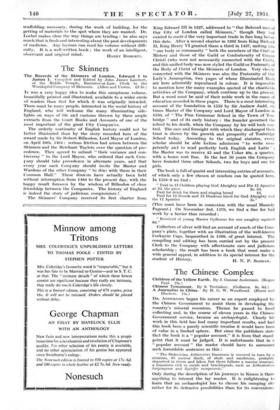The Skinners
The Records of the Skinners of London, Edward I to James I. Compiled and Edited by John James Lambert, of the Middle Temple, Barrister-at-Law, Clerk to the Worshipful Company of Skinners. (Allen and Unwin. £3 3s.)
IT was a very happy idea to make this sumptuous volume, beautifully printed and illustrated, available to a wider circle of readers than that for which it was originally intended. There must be many people, interested in the social history of England, who will welcome the many illuminating side- lights on ways of life and customs thrown by these ample extracts from the Court Books and Accounts of one of the most important of the great City Compan!cs.
The orderly continuity of English history could not be better illustrated than by the story recorded here of the award made by Sir Robert Billesdon, Lord Mayor of London, on April 10th, 1484: serious friction had arisen between the Skinners and the Merchant Taylors over the question of pre- cedence. They agreed to submit " their variance and con- troversy " to the Lord Mayor, who ordered that each Com- pany should take precedence in alternate years, and that every year each Company should invite the Master and Wardens of the other Company " to dine with them in their Common Hall." These dinners have actually been held without interruption from 1484 to the present day, with the
happy result foreseen by the wisdom of Billesdon of close friendship between the Companies.. The history of England is indeed the story of judicious compromises !
The Skinners' Company received its first charter from
King Edward III in 1827, addressed to " Our Beloved men of Our City of London called Skinners," though they had existed to control the very important trade in furs long before this date. After a second charter in 1892 from King Richard II, King Henry VI granted them a third in 1437, uniting into " one body or community " both the members of the Craft or Mistery and those of the Guild or Confraternity of Corpus Christi (who were not necessarily connected with the Craft), and this unified body was now styled the Guild or Fraternity of the Body of Christ of the Skinners of London. Very closely connected with the Skinners was also the Fraternity of Our Lady's Assumption, two pages of whose Illuminated Book are here admirably reproduced in colour. It is impossible to mention here the many examples quoted of the charitable activities of the Company, which continue up to the present. But a word must be said of their noble work in the cause of education recorded in these pages. There is a most interesting account of the foundation in 1553 by Sir Andrew Judd, six times Master of the Company and Lord Mayor of London in 1550, of " The Free Grammar School in the Town of Tun- bridge " and of its early history : the founder governed the school to his death, when the Company by his will took con- trol. The care and foresight with which they discharged their trust is shown by the growth and prosperity of Tonbridge School today. According to the original statutes, every scholar should be able before admission " to write com- petently and to read perfectly both English and Latin ; the Master was to receive 15 and the Usher 40s. a quarter, with a house rent free. In the last 50 years the Company have founded three other Schools, two for boys and one for girls.
The book is full of quaint and interesting entries of accounts, of which only a few chosen at random can be quoted here. In 1518-9 we find : " Paid to 13 Children playing God Almighty and His 12 Apostles at 2d. the piece 2s. 2d.
Paid for drink for them and singing bread 4d.
Paid for 13 Beards and 13 Diadems hired for God Almighty and the 12 Apostles 28.,,
(This must have been in connexion with the usual Maundy Pageant.) On November 3rd, 1579, we find a fine for bad work by a furrier thus recorded : " Received of young Master Gylbome for one naughty squirrel 6d. I
Collectors of silver will find an account of much of the Com- pany's plate, together with an illustration of the well-known Cockayne Cups, bequeathed in 1599, of great interest. The compiling and editing has been carried out by the present Clerk to the Company with affectionate care and judicious scholarship ; the result has been a book that must make a wide general appeal, in addition to its special interest for the


































 Previous page
Previous page